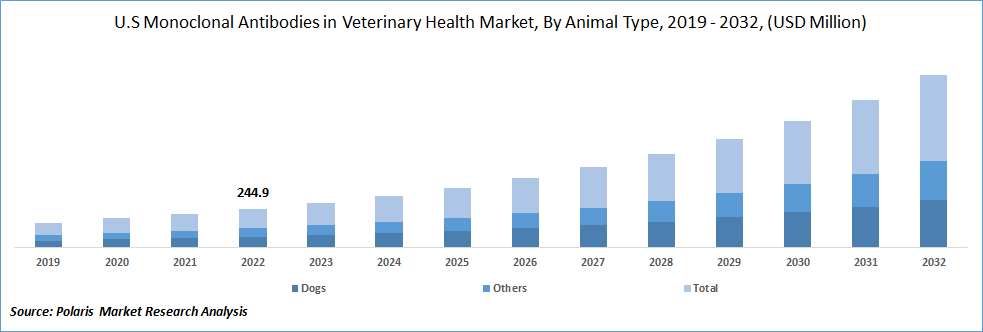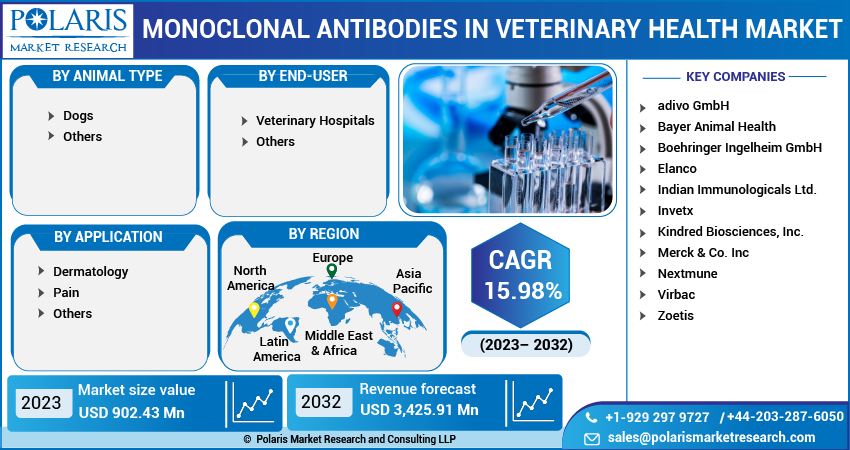
Monoclonal Antibodies in Veterinary Health Market Share, Size, Trends, Industry Analysis Report, By Animal Type (Dogs, Others); By Application (Dermatology, Pain, Others); By End-Use; By Region; Segment Forecast, 2023 - 2032
- Published Date:May-2023
- Pages: 117
- Format: PDF
- Report ID: PM2580
- Base Year: 2022
- Historical Data: 2019-2021
Report Outlook
The global monoclonal antibodies in veterinary health market was valued at USD 785.71 million in 2022 and is expected to grow at a CAGR of 15.98% during the forecast period. The market is expected to grow due to the increasing prevalence of atopic dermatitis drives demand for mAb-based therapies. The rising pet adoption rate creates a larger market for veterinary health products and services, including mAb treatments. Also, the industry is investing heavily in research and development for cancer treatments, which is expected to further drive market growth over the forecast period.

To Understand More About this Research: Request a Free Sample Report
Monoclonal antibodies (mAbs) are synthetic molecules that mimic the immune system's response to harmful pathogens in veterinary health. Their use in treating conditions such as cancer, autoimmune disorders, and infectious diseases in animals grows rapidly as more veterinarians recognize their potential benefits. Compared to traditional treatments like chemotherapy, mAb-based therapies provide a more targeted approach with fewer side effects, making them an attractive option for pet owners.
Furthermore, the prevalence of chronic diseases such as cancer and arthritis in companion animals is increasing, and this is one of the main drivers of the growing market for veterinary mAbs. In addition to treating chronic diseases, mAbs are also used to treat infectious diseases like parvovirus and feline leukemia virus. These treatments can help prevent the spread of disease in animal populations and improve animal welfare, making mAbs an important tool in veterinary medicine.
Despite some disruptions to the supply chain and manufacturing processes, the COVID-19 pandemic has had a limited impact on the monoclonal antibodies (mAbs) in veterinary health market. Pet owners have continued to seek treatment for their animals, leading to stable demand for pet healthcare services and products. Furthermore, the pandemic has increased focus on zoonotic diseases, driving a greater emphasis on animal health and disease prevention and potentially increasing demand for mAb-based treatments.

For Specific Research Requirements, Request for a Sample Report
Industry Dynamics
Growth Drivers
The monoclonal antibodies in veterinary health market is expected to grow significantly due to such as, like in humans, chronic diseases such as cancer, diabetes, and autoimmune disorders becoming more common in animals. Monoclonal antibodies provide an effective and targeted way to treat these diseases, leading to increased demand for these therapies.
The advancements in biotechnology are leading to the creation of more precise and effective monoclonal antibodies for veterinary use. New technologies like gene editing and bioprinting are facilitating the development of innovative therapies. These advancements are expected to boost the growth of the market further.
In addition, rising pet ownership and spending are also driving the growth of the market. The increasing number of pet owners willing to spend more on their pets' healthcare is leading to the demand for more advanced and effective treatments, including monoclonal antibodies.
Furthermore, collaborations and partnerships between biotech and pharmaceutical companies, veterinary clinics, and research institutions are leading to the development more innovative therapies for animal diseases. The increased regulatory approvals of monoclonal antibodies for use in veterinary medicine by regulatory agencies like the FDA and EMA are expected to boost market growth further.
Report Segmentation
The market is primarily segmented based on animal type, application, end-use, and region.
|
By Animal Type |
By Application |
By End-Use |
By Region |
|
|
|
|
For Specific Research Requirements: Request for Customized Report
Dogs segment accounted for the highest revenue share in 2022
The dogs Segment accounted for the highest revenue share owing to the growing number of dogs as pets and the rising cost of maintaining their health. The market has witnessed a surge in revenue, primarily driven by the increasing prevalence of chronic diseases in animals and the rising adoption of pet insurance.
Furthermore, the rising adoption of pet insurance contributes to market growth. Pet owners are increasingly willing to spend more on their pets' healthcare, including advanced treatments such as monoclonal antibodies. This trend is expected to fuel the growth of the market further.
Dermatology segment held the largest revenue share in market
The dermatology segment of the market held the largest revenue share in 2022. The increasing incidences of dermatology diseases such as fleas, ticks, and allergic dermatitis are expected to drive the industry's growth. Some most commonly diagnosed dermatological conditions include allergies, otitis externa, surface pyoderma, and seborrheic dermatitis.
Furthermore, monoclonal antibodies effectively treat viral infections like HIV or hepatitis C, which cannot be prevented by vaccination. Antibodies can act as neutralizing agents, preventing interactions between cells and viruses, and aid in removing viral particles from the patient's body.
The ongoing desire for significant advancements in the animal dermatological sector has led to the development of novel pharmaceuticals for the veterinary industry. This trend is expected to drive the growth of the market. Additionally, the rising prevalence of skin-related disorders, including skin cancer and chronic skin diseases, drives the demand for veterinary dermatological medications.
Veterinary hospitals segment dominated the market with high revenue share
The veterinary hospitals segment dominated the revenue share in the market. The growth of this industry can be attributed to the increasing number of veterinary hospitals and veterinarians. Veterinary hospitals have generated significant revenue due to the availability of innovative therapies.
The market is expected to witness revenue growth in the "others" segment, including research organizations, academic institutes, and veterinary clinics. This growth can be attributed to the developing of novel monoclonal antibody therapeutic factors, which are driving market expansion. Moreover, the market is anticipated to grow further due to the rising awareness of advanced veterinary therapeutic options.
North America dominated the global market in 2022
North American region dominated the global market due to the support of the government and corporate sector initiatives and the increasing popularity of pet insurance. The presence of key market players in the region also contributes to the industry's growth.
Moreover, the Asia Pacific is expected to hold the highest revenue share due to the increasing number of local competitors and veterinary hospitals and clinics. The growing adoption of pets, improved awareness of their diseases, and the availability of alternative forms of therapy are also expected to contribute to the market's growth.
Competitive Insight
Some of the major players operating in the global monoclonal antibodies in veterinary health market include adivo GmbH, Bayer Animal Health, Boehringer Ingelheim GmbH, Elanco; Indian Immunologicals Ltd., Invetx, Kindred Biosciences, Inc., Merck & Co. Inc, Nextmune, Virbac, Zoetis.
Recent Developments
- In August 2021: Elanco Announces Agreement to Acquire Kindred Biosciences. The transaction includes three potential blockbusters in the development phase, fulfills the current pipeline, and strengthens the R&D capabilities for monoclonal antibodies.
- In September 2021: Boehringer Ingelheim, a global leader in veterinary medicine, and Invetx, a Boston-based leader in protein-based therapeutics for animal health, announced that they had worked together to develop novel, species-specific monoclonal antibody biotherapeutics that will initially target illnesses in dogs and cats.
- In October 2021: The largest animal health firm in the world, Zoetis Inc., is enlarging its manufacturing and research facilities in Tullamore, Ireland, which should eventually greatly boost its capacity for making veterinary monoclonal antibodies (mAbs). The innovative Zoetis product pipeline has produced these therapeutic biopharmaceuticals, the most recent innovations in animal medicine.
Monoclonal Antibodies in Veterinary Health Market Report Scope
|
Report Attributes |
Details |
|
Market size value in 2023 |
USD 902.43 million |
|
Revenue forecast in 2032 |
USD 3,425.91 million |
|
CAGR |
15.98% from 2023 – 2032 |
|
Base year |
2022 |
|
Historical data |
2019 – 2021 |
|
Forecast period |
2023 – 2032 |
|
Quantitative units |
Revenue in USD million and CAGR from 2023 to 2032 |
|
Segments Covered |
By Animal Type, By Application, By End-Use, By Region |
|
Regional scope |
North America, Europe, Asia Pacific, Latin America; Middle East & Africa |
|
Key Companies |
adivo GmbH, Bayer Animal Health, Boehringer Ingelheim GmbH, Elanco; Indian Immunologicals Ltd., Invetx, Kindred Biosciences, Inc., Merck & Co. Inc, Nextmune, Virbac, Zoetis. |
FAQ's
The monoclonal antibodies in veterinary health market report covering key segments are animal type, application, end-use, and region.
Monoclonal Antibodies in Veterinary Health Market Size Worth $3,425.91 Million By 2032.
The global monoclonal antibodies in veterinary health market expected to grow at a CAGR of 15.98% during the forecast period.
North America is leading the global market.
key driving factors in monoclonal antibodies in veterinary health market are rising importance of therapeutic monoclonal antibodies.
